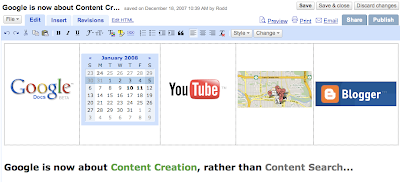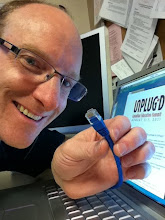
Everyone knows that Google is "The Search Engine that Became a Verb", but relatively few people are aware of the steps Google has taken to become a Webware company. Educators who have yet to discover the value of the Read/Write Web, need to become aware of Google's Tools. (That sounds funnier than I intended...) You may have heard of Blogger, YouTube, Google Maps and more, but have you actually used them. Google Documents is less well-known, but it has powerful literacy connections.
In today's Teacher 2.0 podcast-mini, I've highlighted one of these tools: Google Documents. But before educators can make effective use of these tools, they have to see their usefulness in their own work. Will Richardson's summer commentary hit the mark: "I’ve been trying of late to convince folks that until they understand the uses of these tools in their own learning practice they’ll be really hard pressed to deliver the different pedagogies that go along with them in compelling and effective ways."
In short, Google Documents is an online word processor that allows for the creation of documents (and spreadsheets, and slideshow presentations) that can be edited collaboratively. Google Docs tracks all changes to a given document over time, so a teacher can browse all draft versions of a document highlighting any one person's contributions. This is doable with paper and pen, but now it's a new RSS: Really Simple Supervision!
But wait... There's More! Google documents also provides 'one click publishing'. This is the simplest way I know of, to publish any 'document' online. Your students can have global audiences for their written work if you can find a way to share the links to their work. Any document can be posted to the web. For an overview of how simple it is to do this publishing, view this really short tutorial (What can I say, it's simple!).
Search Skills are still needed! Even though these new tools are being harnessed by new users every day, there are many, many teachers who have yet to master basic online search skills. If educators knew that they could limit their searches to PowerPoint files; or PDF files (colouring pages anyone); or today's news articles... they'd feel empowered to use the web, and would truly be able to Google for Gold.
It's still just a constantly growing sea of information for too many... Little do we realize how this information is 'self-organizing' itself to be the a 'thinking machine'. If you have yet to see Robin Sloan and Matt Thomson's future vision: Epic 2015, this would be a good time!
Maybe the day will come when a user will identify him/herself as a student or teacher, and Google will intuitively provide the most relevant search results. Some search engines already provide personalized responses... but that's another story!




0 comments:
Post a Comment